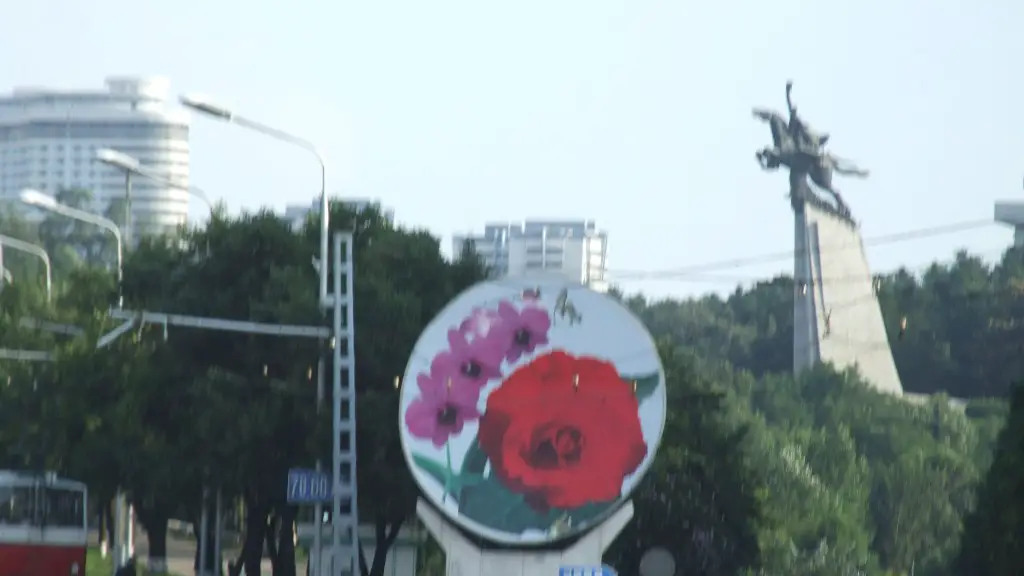North Korea is facing a variety of economic and political sanctions in the international community. Sanctions are a powerful way to punish the country for its nuclear and human rights abuses. But what exactly do the sanctions involve and how do they affect North Korea? In this article, we’ll explore the various sanctions placed on the country, what they target and how effective they are.
The UN Security Council has imposed a set of sanctions on North Korea in response to the regime’s nuclear tests, multiple human rights violations, and violations of UN resolutions. These measures include an arms embargo, asset freeze, travel ban and export controls.
The arms embargo prohibits North Korea from purchasing, selling or transporting any weapons or related materials. This makes it difficult for the country to acquire sophisticated weapons and military hardware. The asset freeze imposes a ban on North Korean money and assets held abroad, preventing the country from accessing funds to purchase weapons or finance terrorist activities. The travel ban restricts the travel of North Koreans abroad, while the export bans limit the export of certain products, such as coal and textiles, that are a major source of income for the regime.
The impact of these sanctions has been mixed. Primarily, they have had a significant economic effect on North Korea, reducing the country’s foreign exchange reserves and squeezing its economy. According to estimates from the US Treasury Department, the sanctions have reduced North Korea’s export revenues by around 90 percent. This has had a negative impact on the regime’s finances and the living standards of its people.
At the same time, some experts argue that the sanctions have failed to stop North Korea’s nuclear programme. The regime has continued to develop its programme despite international pressure, which some attribute to the regime’s willingness to bear the cost of the sanctions rather than yield to them. Others point to the effectiveness of North Korea’s illicit activity, such as trading weapons and other commodities, in evading sanctions.
There have been efforts to increase the effectiveness of the sanctions. In 2017, the UN Security Council imposed an additional set of sanctions on North Korea in response to a series of ballistic missile tests. The measures targeted North Korea’s energy sector, banned imports of specific types of petroleum products, restricted the exports of coal and seafood, and banned the export of workers to other countries.
However, some argue that the efficacy of these measures is also limited. The regime has been increasingly dependent on fuel smuggled via China, which has undermined the impact of restrictions on the energy sector. Overall, it is difficult to gauge the precise impact of sanctions on North Korea’s economy, as the country is notoriously insular and does not publish official statistics.
Long-term Impact
Experts disagree on the long-term impact of sanctions on North Korea. On one hand, they could eventually lead to a collapse of the regime, although many suggest that this is unlikely given the regime’s willingness to bear hardships and its ability to survive even the strictest sanctions. On the other, some argue that sanctions, by maintaining pressure on the regime and weakening its economy, could eventually lead to political pressure for change.
At the same time, there is growing concern that sanctions are having a negative impact on the North Korean people. Access to food, medical treatments and other basic necessities has been severely restricted, leading to increasing poverty and hunger. The UN has warned that up to 10 million North Koreans are facing “severe food shortages” and warned of a potential famine.
There is also widespread concern that the sanctions and the reduction of economic activity have had a devastating effect on the country’s health care system. Reports suggest that the most vulnerable members of society, such as the elderly and children, have been the most affected by shortages of medicines and health services.
International Support
The international community is divided on the issue of the sanctions on North Korea. The US, European Union, Japan and South Korea have all been supportive of the measures, while China and Russia have been critical. China has argued that the sanctions are overly punitive and have not been effective in achieving their desired results, while Russia has called for an easing of sanctions to allow for more humanitarian aid.
Overall, the situation remains fluid. North Korea has recently indicated that it is willing to engage with the international community and move towards denuclearisation. This may open the door to further talks and potential negotiations to lift or relax the sanctions.
At the same time, the Trump administration has indicated that it is open to an aggressive stance on North Korea if it does not demonstrate a willingness to abandon its nuclear programme. Whether these negotiations will lead to a resolution of the current crisis, or an escalation of the conflict, remains to be seen.
Effects on Neighbors
The sanctions on North Korea have also had a significant effect in its neighbouring countries. China, in particular, has been severely impacted. The country is the largest trading partner with North Korea and the sanctions have had a major impact on its economy. Trade between the two countries has dropped dramatically, and Chinese exports to North Korea are estimated to have been reduced by over 80 percent.
South Korea has also seen an economic impact, with exports to North Korea dropping by nearly 90 percent since the introduction of sanctions. This has had a major impact on the South Korean economy and many South Korean companies that relied heavily on North Korean trade have been hard hit.
Overall, the sanctions on North Korea have had a major impact on its economy and the lives of its people. It is difficult to gauge the precise effect, but there is a widespread consensus that the sanctions have had a negative impact on its economy and the living standards of its citizens.
Social and Political Effects
The sanctions on North Korea have also had social and political effects. The regime has become increasingly authoritarian, with reports of increasing levels of repression and censorship. This consolidation of power has only been strengthened by the sanctions, as they have reduced the regime’s ability to access foreign markets and foreign investments.
At the same time, the sanctions have made it increasingly difficult for North Koreans to access information from the outside world. This has had a significant impact on the country’s citizens, as they have become more isolated and less able to understand the international community’s perspective.
Ultimately, the effects of the sanctions have been wide-reaching and profound. They have had a major impact on North Korea’s economy, living standards and international relations. It remains to be seen if and how the sanctions will change as North Korea engages with the international community and moves towards denuclearisation.
Policy Changes
In light of the sanctions and the effect they have had on North Korea, there have been calls for policy changes. Some experts have argued for a relaxation of the sanctions, arguing that further restrictions could lead to further suffering for the North Korean people. Others have argued for a more comprehensive approach, including a mix of sanctions and diplomatic engagement.
At the same time, there are concerns that a relaxation of sanctions could send the wrong signal to North Korea and weaken the international community’s negotiating position. Some fear that any easing of sanctions could be seen as a reward for North Korea’s continued development of its nuclear programme.
Ultimately, it remains to be seen how the international community will respond to the situation in North Korea. What is certain is that the sanctions have had a profound effect on the country, and that any resolution of the conflict must take into account the needs and concerns of the North Korean people.
Economic Impact
The economic impact of the sanctions has been significant. The sanctions have had a severe impact on North Korea’s economic output and its ability to generate foreign exchange. This has led to a severe shortage of basic necessities and essential goods, as well as a dramatic drop in the standard of living. Reports suggest that the sanctions have reduced North Korea’s GDP by over 30 percent.
The effect of the sanctions has been particularly severe in rural areas, where the economy is heavily dependent on agricultural and animal husbandry. Reports suggest that up to 70 percent of the population is suffering from food shortages and malnutrition.
The sanctions have also had an impact on North Korea’s industry and infrastructure, with reports of power shortages and electricity rationing. This has had a significant impact on businesses, with reports of factory closures and a reduction in industrial production.
Overall, the sanctions have had a devastating effect on North Korea’s economy. While the long-term impact of the measures is difficult to gauge, the immediate effects have been severe.
Conclusion
The international community has imposed a range of economic and political sanctions on North Korea in response to the regime’s nuclear tests and human rights abuses. The impact of these sanctions has been mixed, with some experts arguing that they have been ineffective in stopping the regime’s nuclear programme. Nevertheless, there is a widespread consensus that the sanctions have had a negative effect on North Korea’s economy and the well-being of its people.
At the same time, the sanctions have sparked an international debate on their effectiveness and their impact on the North Korean people. As the situation in North Korea continues to evolve, it remains to be seen how the international community will respond to the situation. In the coming months and years, the outcome of this debate will be a major factor in determining the future of North Korea.





